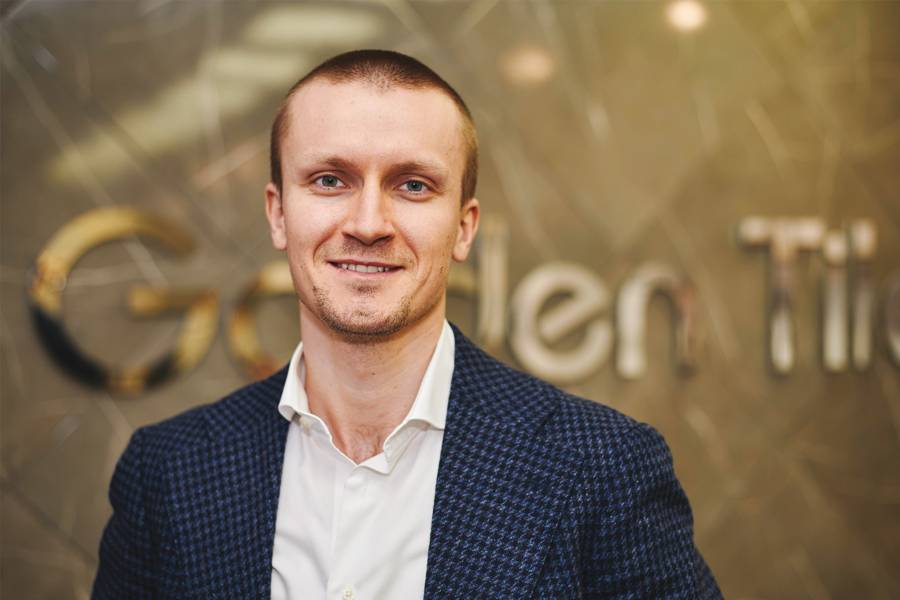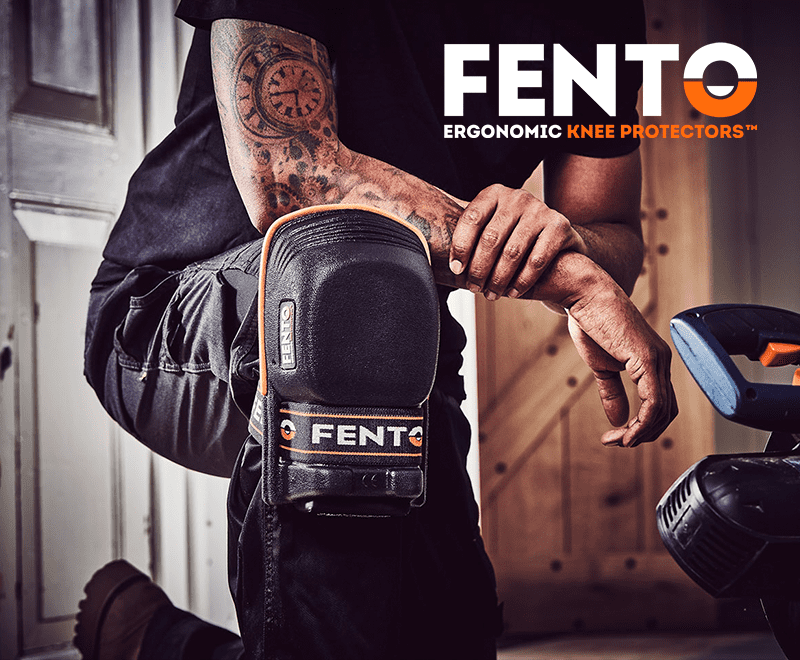Seven years ago, Volodymyr Shevetovskyy incorporated the UK branch of Golden Tile, a Ukrainian tile manufacturer and distributor, and since that time, the team has worked tirelessly to establish a solid, well-respected business in the UK.
In February of 2022, however, Russia’s shocking invasion of Ukraine threw the company and its home into a state of uncertainty and terror. This month, TSJ spoke with Shevetovskyy to trace this story from the beginning until now and found out why – despite having ample reason to feel scared – he remains optimistic for the future.
Golden Tile Ceramic Group is a Ukrainian company made up of four subsidiary entities, the first and largest of which is Kharkiv Tile Plant. Originally built during the Soviet era, before the Second World War, the factory was purchased by its current management in 2003, and has since been “fully modernised” using the most advanced technology from suppliers such as Sacmi in Italy, now boasting several fully automated production lines.
Originally, the company only distributed its tiles in the domestic market (indeed, by 2007, it was the “leader of the Ukrainian market”). However, Shevetovskyy says that after the 2008 financial crisis, Golden Tile’s management realised it needed to diversify the company, and there was a need to expand into different markets. This process began with exporting into Western Europe – companies like Poland, Germany, Switzerland and Belgium – and by 2022, just before the start of the war, Golden Tile products were being sold in countries around the world, including the US and Canada.
One of the group’s key competitive advantages, beyond its manufacturing capabilities, is the fact that two of the other companies under the Golden Tile umbrella are quarries in Ukraine. These sites produce the main raw materials used in the production of tiles, giving Golden Tile an important edge over other manufacturers in Europe.
New horizons
In 2008, Shevetovskyy moved to the UK. Golden Tile is a family business which he had always planned to join eventually, but stresses: “I wanted to join it in a way that I could add some value to the company.” By 2016, the factory had significantly increased its export presence in Europe, and although its products had never before been sold in the United Kingdom, Shevetovskyy saw this market as an opportunity to create that value for the company. “Since I live here,” he says, “and I love the idea of promoting brands made in Ukraine and made by Golden tile, I decided to register the company here and began running our operations.”
Golden Tile Distribution (as the business is called in the UK) is a lean team of four. Two employees are responsible for operations – one dealing with the factory back in Ukraine and the other handling processes once the tiles arrive in the UK. Between them, these two employees ensure all of the companies orders are “executed and delivered perfectly,” Shevetovskyy says, “that whatever the 4 client orders is exactly what we deliver”. This can involve special requests in particular orders: unusual sizes of pallets, extra stickers, anything a client might need, the team will do its best to provide. The UK-side operations manager communicates directly with both clients and hauliers to ensure the delivery process itself proceeds as smoothly as possible.
The other half of the team is sales, comprising one other employee as well as Shevetovskyy himself. Additionally, as director, Shevetovskyy views it as his responsibility to always be involved “wherever the problems are”. For instance, back when the company was first incorporated in 2016, the team’s problems were strikingly simple: no one knew who they were and they had no sales. “So that was 100% of my focus,” Shevetovskyy explains, “to cold call people and arrange meetings, to receive orders and start building relationships”. When asked if there was any initial difficulty in selling UK buyers on Ukrainian product, he responds emphatically: “Oh, absolutely, absolutely. People – especially in business – have a very conservative nature.” To begin with, it was difficult to get businesses to even consider a new market.
This issue was actually compounded by one of the UK’s tile sector best qualities: its deep roots and longevity. Many of the people Shevetovskyy would go to meetings with were “40, 50, even 60 years old” with many decades of experience in the industry. “And then here I come with my team. I’m under 30 years old and I start to show a product from a place they’ve never heard about and they think: why should I be the first one to buy?” He recounts his first meeting with a UK distributor, where the prospective client’s “British humour” seemed more a cover for hostility than good-natured fun. To Shevetovskyy though, these were simply the problems he had to overcome, and he never took these comments personally.
Still, the challenges were severe. In its first year of operating in the UK, Golden Tile Distribution sold just five containers “with massive struggles” – each sale the team made requiring two or three meetings. One of the reasons for this, Shevetovskyy suspects, is because there are so few Ukrainian tiles being sold in the UK, the company had to shore up a national reputation almost single-handedly. He recalls a meeting where the client said they had worked with just one Ukrainian factory previously. In that instance, the first container supplied was good, but the second was “absolutely terrible”.
Suddenly, despite being a different business altogether, this was Golden Tile’s problem. “That factory is our competitor in Ukraine, we know them,” Shevetovskyy says. “And that creates a bad face for Ukrainian tile manufacture, so we had to figure out what to do.” Eventually, through diligent and consistent service for its clients, the company began to “slowly, slowly” shift perceptions. “You make one, two, three deliveries to clients, they see your products arrive and they sell them.” Once that crucial initial confidence was established, things started to improve – and improve quickly. In fact, by 2020, Golden Tile was selling some 700,000sqm a year, an impressive jump from just five containers a few years earlier!
Several factors contributed to this rapid expansion of Golden Tile’s UK business, but the company’s guiding principle seems to be to eliminate as many points of friction for buyers as possible. After receiving an order, the team handles customs clearance and arranges delivery of the containers straight to the client’s warehouse. Orders are quoted and invoiced in sterling, avoiding any confusion or difficulty with international currency exchange. Moreover, the Kharkiv Tile Plant offers both enormous capacity and a very wide product selection, “from ceramics to porcelain, from small formats like metro tiles, to large formats like 600x1200mm,” making it a straightforward choice for a variety of tiling needs.
When problems do arise (as they inevitably will) the team’s philosophy is to solve them in a way that shows they care about their clients. For Golden Tile, Shevetovskyy explains, “it’s about long term business – our partnerships. That’s how we’ve managed to remain in the UK for the last 7 years and how we’ve built successful relationships with our clients.”
“The worst day”
This story – like the individual stories of all Ukrainian people – was thrown violently off-course last year when Vladimir Putin announced Russia’s “special military operation” in Ukraine. The 15 months of sustained invasion since has been unquestionably devastating, but the people of Ukraine have refused to let it break their spirits. Shevetovskyy begun this part of our discussion by sharing a brief story.
“On the 24 February, 2022, the war began, and it was the worst day for all Ukrainians. On the first day of the invasion, I remember there was a story in the New York Times that said: ‘the capital of Ukraine will be taken in 48-72 hours’. When that happens, people are obviously in shock, they’re panicked. Normally, people plan years ahead or months ahead, but when the war started, you were planning down to the next hour or the next 24 hours.
“So what our factory did was this: we turned off production and arranged for the use of a bomb shelter located on the factory premises. (The factory was built during the Soviet era, when heightened military tension meant many such buildings incorporated bomb shelters.) We started to prepare the shelter for people who worked at the factory and for civilians nearby. We started to provide food, water and shelter for the people who could come and hide.
“From our factory, 150 very heroic people volunteered to join the army. That was the first few days and weeks of the war for us. Nobody was thinking about business at the time, people were just thinking about how to survive.”
The city of Kharkiv, where the factory is located, lies just 40km from the Russian border, and so on the first day of the war, the invading army reached its outskirts. By the end of March, however, Ukraine’s armies had managed to repel the Russian forces from not just Kharkiv, but also the capital city of Kyiv along with two other cities in the north. “And this gave hope to the Ukrainian people.” This small nation, which much of the world had assumed would fall to Russian aggression in a matter of days, was fighting back.
A national understanding
And from here, the outlook of both Ukraine’s people and its businesses – Golden Tile included – began to shift. “Everybody in Ukraine has an understanding,” Shevetovskyy explains. “Every Ukrainian has to help their country if we want to win.” Of course, it’s not possible for everyone to enlist and fight in the army, so for those who can’t, the next best thing is to continue to work. If people work, businesses can keep paying salaries, people can continue to live and companies can continue paying taxes to the government. In April of 2022 then, less than two whole months from the start of the invasion, and despite continued shelling of the city, Golden Tile started selling to its clients again.
The months passed, and against all odds, the situation actually improved on the front lines. By August 2022, Kharkiv Tile Plant was able to restart the first of its nine production lines, and in September it restarted a second. What’s more, these are the most powerful lines within the factory, meaning it can produce a proportionally higher percentage of its full capacity than the gradual reopening might suggest. In fact, even in these extraordinary circumstances, Shevetovskyy reveals, the company still made around 30% of the sales it had achieved the previous year – amounting to millions of square metres.
Of course, for Ukrainians, “it’s no longer just about business. It’s no longer just about selling tiles. For us, it’s about victory”. One way the business is placing national solidarity above crude financial calculation, for example: those 150 employees of Golden Tile who joined the army when the war broke out are still being paid a salary by the company, in addition to their pay from the government. More significantly still, the group has set up a charitable organisation called the St Valentine fund in Kharkiv. Every fortnight, using excess profit generated by the business, this fund sends a truck with 20 tons of food, water and other humanitarian aid to the people who live in the city. “We realised we need to work so we can help our army, our country and our economy,” Shevetovskyy explains.
Rebuilding a future
This shared understanding of what needs to be done has fostered a renewed sense of hope and resilience in the Ukrainian people. “I am personally very positive,” Shevetovskyy says, “and I think all Ukrainians believe we will have a victory this year, hopefully. It’s not guaranteed, but I think the worst has already passed.” Putin’s military propaganda has been very effective, he suggests, but with all of the support the nation has received from allies across the globe, with every victory Ukraine achieves against the invading force, that image of an invincible Russian army has started to crack.
For Golden Tile and many businesses like it, while the war effort must take overwhelming priority now, there is an important job for the near future. “Our factory understands we will need to be rebuilding our country after the war. We’ll have a lot of work and there will be a lot of construction to do. So we’re very positive that there is a bright future ahead.” Even now, Shevetovskyy emphasises – despite the devastation being visited on their home – people continue to work, build, and live their lives.
“When you read the news, people are only going to publish horror – there are very few cases where someone will say, ‘people are working in Ukraine’. Hopefully we can change that and say: there is light at the end of the tunnel.”
www.goldentile.com.ua/en









